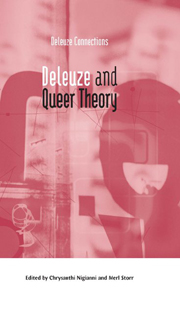Book contents
- Frontmatter
- Contents
- Introduction
- 1 On the Very Possibility of Queer Theory Claire Colebrook
- 2 Thirty-six Thousand Forms of Love: The Queering of Deleuze and Guattari
- 3 The Sexed Subject in-between Deleuze and Butler Anna Hickey-Moody and Mary Lou Rasmussen
- 4 Every ‘One’ – a Crowd, Making Room for the Excluded Middle
- 5 The Adventures of a Sex
- 6 Queer Hybridity
- 7 Prosthetic Performativity: Deleuzian Connections and Queer Corporealities
- 8 Unnatural Alliances
- 9 Schreber and the Penetrated Male
- 10 Butterfly Kiss: The Contagious Kiss of Becoming-Lesbian Chrysanthi Nigianni
- Notes on Contributors
- Index
7 - Prosthetic Performativity: Deleuzian Connections and Queer Corporealities
Published online by Cambridge University Press: 12 September 2012
- Frontmatter
- Contents
- Introduction
- 1 On the Very Possibility of Queer Theory Claire Colebrook
- 2 Thirty-six Thousand Forms of Love: The Queering of Deleuze and Guattari
- 3 The Sexed Subject in-between Deleuze and Butler Anna Hickey-Moody and Mary Lou Rasmussen
- 4 Every ‘One’ – a Crowd, Making Room for the Excluded Middle
- 5 The Adventures of a Sex
- 6 Queer Hybridity
- 7 Prosthetic Performativity: Deleuzian Connections and Queer Corporealities
- 8 Unnatural Alliances
- 9 Schreber and the Penetrated Male
- 10 Butterfly Kiss: The Contagious Kiss of Becoming-Lesbian Chrysanthi Nigianni
- Notes on Contributors
- Index
Summary
What could be more seductive – to a collectivity of binary breaking neomaterialist academics – than a book organised, to quote the editors, around minoritarian thinking/practices, a (con)text that promises to interpose DeleuzoGuattarian theory with queer becomings to enhance the productivity of both? Of course I shall join the project: I read and respect the work of my co-authors, regret missing the originating conference, and welcome the opportunity to explore my own emerging lines of flight. And yet … perhaps I have understood the proposal all the wrong way round. I do indeed work extensively in the field of minoritarian thinking/practices, more specifically in the field of Critical Disability Studies, where I am developing a Deleuzian approach, and yet there seems to be limited overlap between my material concerns and those of others whether they are Deleuzian scholars and theorists of disability. What is by now well established and growing, however, is a turn by many of the latter to the possibilities and insights of queer theory as an effective methodology for opening up understanding of the relation between bodies and of the constitution of corporeality in general. The binary of disabled and non-disabled undoubtedly lingers within that approach, but it is increasingly destabilised by the intimation that all forms of embodiment are subject to reconstruction, extension and transformation, regardless of the conventionally identified vectors of change and decay.
- Type
- Chapter
- Information
- Deleuze and Queer Theory , pp. 115 - 133Publisher: Edinburgh University PressPrint publication year: 2009

